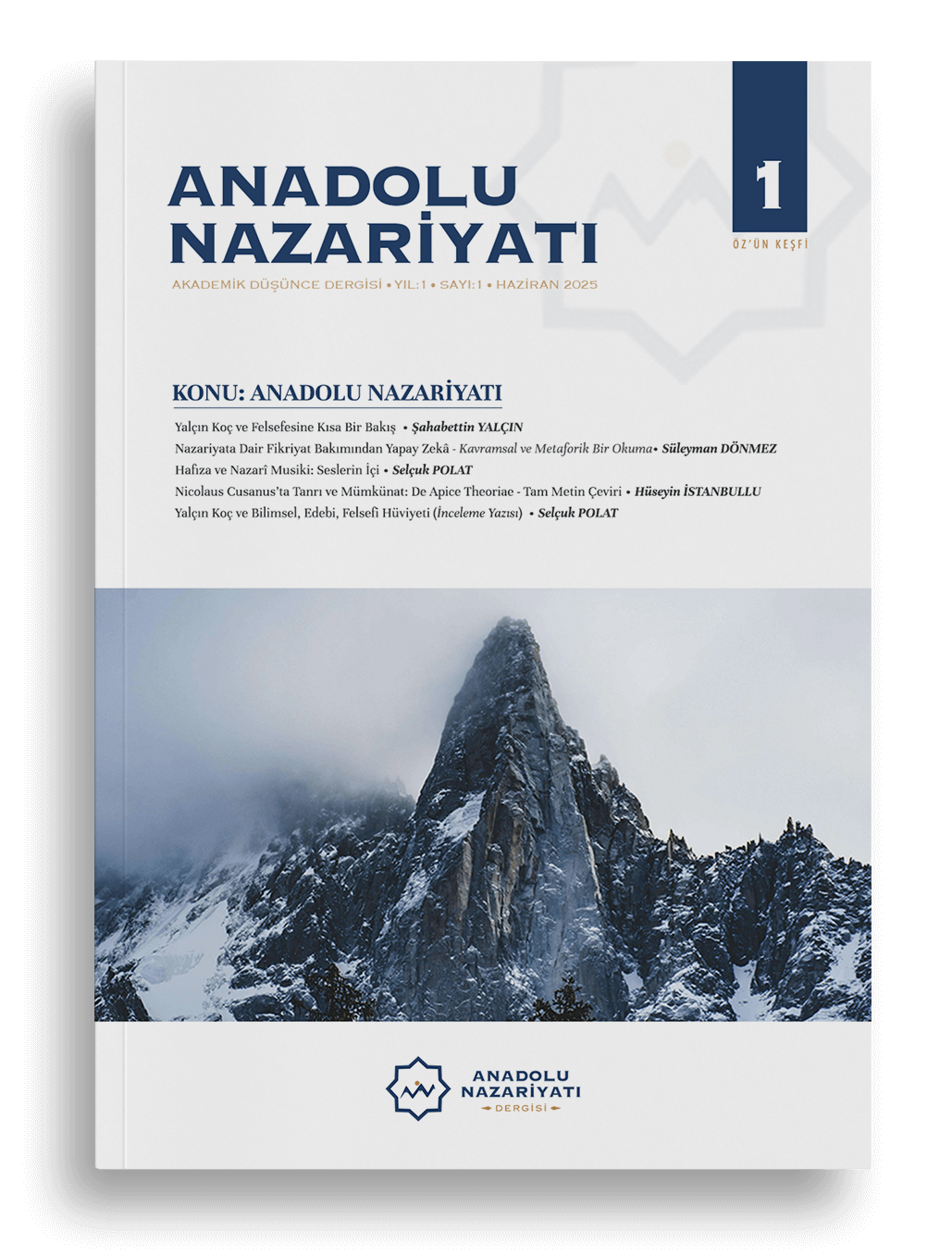NICOLAUS CUSANUS’TA TANRI ve MÜMKÜNAT: DE APICE THEORIAE – TAM METİN ÇEVİRİ
E-ISSN: 3108-5377
Hüseyin İstanbullu
Öz
Nicolaus Cusanus (d. 1401, Kues, Trier - ö. 11 Ağustos 1464, Todi) gerek Sokrates, Platon ve Aristoteles felsefesinin sentezinden oluşan fikriyatı (logia), gerek Sözde-Dionisios Areopagites, John Scottus Eriugena ve Meister Eckhart mistisizmine dayanan nazariyatı (theoria) ile Geç Orta Çağ’dan Erken Rönesans’a geçiş döneminin en önemli düşünürlerinden biridir. Felsefeden teolojiye, matematikten geometri ve doğa bilimlerine değin eserler içeren kapsamlı külliyatından günümüze elliyi aşkın özgün eser, 294 vaaz ve birçok mektup ulaşmıştır. Öne çıkan başlıca eserleri arasında De docta ignorantia (Öğrenilmiș Cehalet Üzerine, 1440), De coniecturis (Zanlar Üzerine, 1441-1442), De visione Dei (Tanrı Görüsü Üzerine, 1453) De venatione sapientiae (Bilgeliğin Peşinde, 1462) ve bu çalışmada tam tercümesini sunacağımız De apice theoriae (Nazariyatın Zirvesi Üzerine, 1464) yer alır.
Anahtar Kelimeler: Felsefe, Cusanus, Mistisizm, Nazariyat, Metafizik
God and Possibility in Nicolaus Cusanus: De apice theoriae - A Complete Translation
Abstract
Nicolaus Cusanus (b. 1401 in Kues, Trier - d. August 11, 1464 in Todi) stands among the foremost thinkers of the transitional period between the Late Middle Ages and the Early Renaissance. This preeminence derives from both his discursive thought (logia), synthesizing the philosophies of Socrates, Plato, and Aristotle, and his contemplative reflection (theoria), rooted in the mysticism of Pseudo-Dionysius the Areopagite, John Scottus Eriugena, and Meister Eckhart. From his extensive corpus, comprising works ranging from philosophy and theology to mathematics, geometry, and natural sciences, over fifty original treatises, 294 sermons, and numerous letters survive to the present day. Among his principal works are De docta ignorantia (On Learned Ignorance, 1440), De coniecturis (On Conjectures, 1441-1442), De visione Dei (The Vision of God, 1453), De venatione sapientiae (On the Pursuit of Wisdom, 1462), and De apice theoriae (Concerning the Loftiest Level of Contemplative Reflection, 1464). This study presents a complete translation of the latter work.
Keywords: Philosophy, Cusanus, Mysticism, Theory, Metaphysics
Öz
Nicolaus Cusanus (d. 1401, Kues, Trier - ö. 11 Ağustos 1464, Todi) gerek Sokrates, Platon ve Aristoteles felsefesinin sentezinden oluşan fikriyatı (logia), gerek Sözde-Dionisios Areopagites, John Scottus Eriugena ve Meister Eckhart mistisizmine dayanan nazariyatı (theoria) ile Geç Orta Çağ’dan Erken Rönesans’a geçiş döneminin en önemli düşünürlerinden biridir. Felsefeden teolojiye, matematikten geometri ve doğa bilimlerine değin eserler içeren kapsamlı külliyatından günümüze elliyi aşkın özgün eser, 294 vaaz ve birçok mektup ulaşmıştır. Öne çıkan başlıca eserleri arasında De docta ignorantia (Öğrenilmiș Cehalet Üzerine, 1440), De coniecturis (Zanlar Üzerine, 1441-1442), De visione Dei (Tanrı Görüsü Üzerine, 1453) De venatione sapientiae (Bilgeliğin Peşinde, 1462) ve bu çalışmada tam tercümesini sunacağımız De apice theoriae (Nazariyatın Zirvesi Üzerine, 1464) yer alır.
Anahtar Kelimeler: Felsefe, Cusanus, Mistisizm, Nazariyat, Metafizik
God and Possibility in Nicolaus Cusanus: De apice theoriae - A Complete Translation
Abstract
Nicolaus Cusanus (b. 1401 in Kues, Trier - d. August 11, 1464 in Todi) stands among the foremost thinkers of the transitional period between the Late Middle Ages and the Early Renaissance. This preeminence derives from both his discursive thought (logia), synthesizing the philosophies of Socrates, Plato, and Aristotle, and his contemplative reflection (theoria), rooted in the mysticism of Pseudo-Dionysius the Areopagite, John Scottus Eriugena, and Meister Eckhart. From his extensive corpus, comprising works ranging from philosophy and theology to mathematics, geometry, and natural sciences, over fifty original treatises, 294 sermons, and numerous letters survive to the present day. Among his principal works are De docta ignorantia (On Learned Ignorance, 1440), De coniecturis (On Conjectures, 1441-1442), De visione Dei (The Vision of God, 1453), De venatione sapientiae (On the Pursuit of Wisdom, 1462), and De apice theoriae (Concerning the Loftiest Level of Contemplative Reflection, 1464). This study presents a complete translation of the latter work.
Keywords: Philosophy, Cusanus, Mysticism, Theory, Metaphysics

